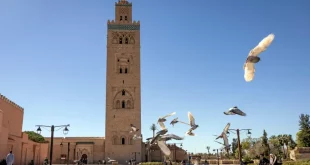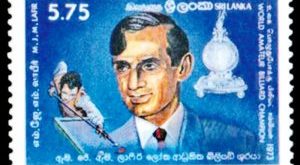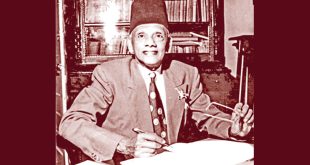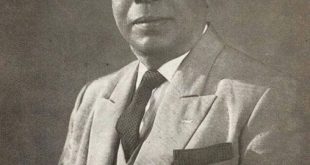Every time the Muse called Mohideen Baig, he left everything behind and went in search of his destiny.
 As chronicles go, it happened at least twice in his life.
As chronicles go, it happened at least twice in his life.
The first time was in Salem, Madras, the homeland he was born in.
Mohideen Baig
Baig’s Head Master summoned his father to tell that the son was not bent on studies. The next day, Baig ran away from home to Boys Dance Company in Trichy.
Asked to show his credentials, he sang a song of India’s then famed blind singer K.C. Dey and earned a contract to sing for the male lead.
Meanwhile, colleagues of his father, a buglar in the Madras Police Band, spread their net to catch the runaway boy. They came to the theatre, waited unobtrusively until Baig had finished his last song and promptly took him home.
But the damage had been done. Young Baig’s fate was sealed in the stars. He announced to his stunned family that he would follow in the footsteps of Ustads.
The second time was in Lanka, the homeland that was to adopt him.
Accompanying his parents to the untimely funeral of his brother in Ceylon Police, he was drafted into service. Music-lorn Baig fretted and soon quit.
In India, he had spent time listening to music from the Akbar Dynasty, going on to classical kawalis, ghazals and bhajans. Ustad Ahmed Baksh taught him the basics of music.
The Muse had not called Baig in vain.
Ceylonese musician Mohamed Ghouse, popularly known as Ghouse Master, became a patron to Baig and took him to music recitals at wealthy homes and introduced him to Radio Ceylon. Baig sang Hindustani, Tamil and Islamic songs on air.
The golden era of Gramaphone records gave him his first breakthrough. His first Sinhala song, Karuna Muhude Namu Gilila, dueted with K. Rajalakshmi and music by Ghouse Master, was recorded under Columbia label. The musical journey so began was to take him through a huge amount of songs sung in Sinhala, Tamil, Urdu and Hindi, counting among them ghazals and devotional songs. His next entry was into Sinhala playback singing. He sang Nayana Veni Sudo with Bhagyawathi for Ashokamala, the second Sinhala film. More than 400 films followed this, with Baig singing for box office hits such as Daiva Yogaya, Kele Handa, Sujatha, Deiyanne Rate and Allapu Gedera.
He dueted with all the legendary names of the era, Rukmani Devi, Jamuna Rani, G.S.B. Rani Perera, Lath Walpola, Sujatha Attanayake, Angeline Goonetileke, H.R. Jothipala and Dharmadasa Walpola, to name a few. The list went on. Baig is the only Lankan singer to sing with Latha Mangeskar, which was for the film Sada Sulang.
He sang Prana Puda Surakimu Sri Lanka when Ceylon became an independent nation on 1948 February 4. In 1956, then Prime Minister the late S.W.R.D. Bandaranaike conferred on Baig distinguished citizenship of the country he loved.
Baig won the 1967 Sarasaviya Award for the Best Playback Singer for his singing in the film Allapu Gedera.
He sang the welcome song for the leaders of the Non-Aligned Nations when its summit was held in Sri Lanka in 1974. He was honoured with Kalashoori Awards in 1983 and 1987. He directed music in the films Sangavunu Menika and Jeevana Geethaya. He also appeared singing in some films.
“I am from the country the Buddha was born in,” Baig is said to have told his son. “So I like singing Buddhist songs. Whatever religion we belong to, we are born from a mother. All religions show us how to live better. From the Buddhist songs I sang, I learnt a great deal. Until I die, I will sing for Sinhala Buddhists. The love I gained from this country’s people is the biggest triumph of my life.”
Born in 1919, he breathed his last while under anaesthesia for an eye operation.
Even 18 years after his death, Baig has not relaxed his mysterious stronghold in the Sinhala Buddhist devotional singing sphere. Despite the many original songs that have captured the ear, his Sinhala rendition of Mannaday’s Buddan Saranam Gachchami, sung for the film Angulimala, remains to this day, the only song to be played over loud speakers at almost every Wesak pandal, temple activity and Buddhist ceremony.
Although of Islamic faith, he is the Sinhala singer to have sung the highest number of Buddhist songs. No one has been able to replace that exact timbre of voice, except perhaps somewhat by his son Ishak.
The Muse had been true to Alhaj Mohideen Baig.
 Sri lanka Muslims Web Portal Diversity and Inclusiveness
Sri lanka Muslims Web Portal Diversity and Inclusiveness



